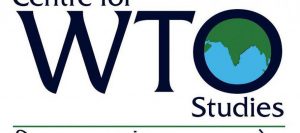Partnership of MoCI with Indian Center for WTO Studies
 Afghanistan’s Ministry of Commerce and Industries (MoCI) and the Delhi-based Center for WTO Studies (CWS) have entered into a partnership for the capacity building of MoCI. The partnership agreement was finalized by Mohammad Haqjo, Deputy Minister for Commerce and Industries, and Abhijit Das, Head and Professor of CWS, in Delhi on 31 March.
Afghanistan’s Ministry of Commerce and Industries (MoCI) and the Delhi-based Center for WTO Studies (CWS) have entered into a partnership for the capacity building of MoCI. The partnership agreement was finalized by Mohammad Haqjo, Deputy Minister for Commerce and Industries, and Abhijit Das, Head and Professor of CWS, in Delhi on 31 March.
The partnership agreement has been facilitated by the International Trade Center (ITC) as part of the European Union-funded Advancing Afghan Trade project. As the partnership between MoCI and CWS develops, ITC will continue to play a role in ensuring its successful implementation.
CWS, a leading provider of teaching, training, consulting and research in the field of international trade regulation, will assist MoCI in capacity building activities to strengthen the ministry’s technical capacity and training capabilities.
A key focus for CWS will be developing a training program on trade policy formulation, negotiation and implementation issues over a two-year period to build capacity of core officers working for MoCI, as well as other trade-related ministries and implementing agencies. Quoted from (Wadsam).
The program will cover topics such as trade analysis, trade diplomacy, trade litigation and professional monitoring of compliance and effects of trade agreements.
In-class training will be followed up by ‘on-the-job’ coaching, providing targeted support to participating officers. By the end of the program, participants will be expected to have advanced their understanding of the professional skills in these areas.
Importantly, CWS and MoCI will work together to ensure that local ownership of the training program is secured, allowing for the program to be implemented locally following the involvement of CWS. This will contribute to the efforts by MoCI for establishing a Kabul-based trade and investment institute, ensuring the sustainability of the contribution made by the EU project.
Minister Haqjo said: ‘The CWS trade related short and long-term trainings will enhance the knowledge and understanding of Ministry of Commerce and Industries staff and policy makers in areas such as: trade policy formulation, trade statistics, WTO agreements and related issues, export promotion, trade facilitation, transit issues and investment.’
Abhijit Das, Head and Professor, CWS, said: ‘We eagerly look forward to working closely with MoCI Afghanistan in this unique initiative for enhancing trade-related capacities in Afghanistan. We hope to follow an extremely structured approach, with real-life problem solving orientation, in the training programs.’
A central component of the Advancing Afghan Trade project is to build local capacity on trade policy so that stakeholders (in particular MoCI) are better placed to formulate trade policies, ultimately enhancing export competitiveness. The building of technical capacities will be further augmented by stakeholder consultations on key trade policy and negotiation issues.
The Advancing Afghan Trade project is a project funded by the European Union and is being implemented by ITC under the leadership of the Ministry of Commerce and Industries (MoCI).
The intervention is recognition of ongoing efforts by the Afghan government to use trade as a driver of economic growth, regional cooperation and stability. Afghanistan acceded to the WTO in July 2016 and has placed trade and regional economic cooperation at the heart of its development strategy. Its first action after acceding to the WTO was to ratify the body’s Trade Facilitation Agreement.
To ensure sustainability, local ownership and long-term impact of the project, ITC will be working with a range of partners from the private sector, non-governmental organizations, academia and civil-society organizations based in Afghanistan.
ITC is the joint agency of the World Trade Organization and the United Nations. ITC assists small and medium-sized enterprises in developing and transition economies to become more competitive in global markets, thereby contributing to sustainable economic development within the frameworks of the Aid-for-Trade agenda and the United Nations’ Global Goals for Sustainable Development.